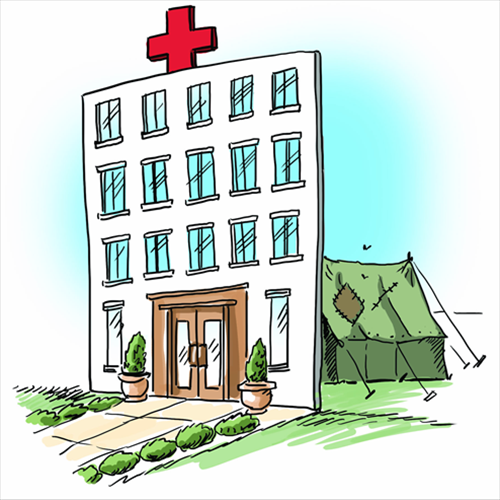Time to level out healthcare inequalities

Illustration: Liu Rui/GT
Being sick in China is a miserable experience, and not just physically. Trying to get seen at a hospital, unless you have a backdoor into the system, inevitably means long queues, longer waits, other people clamoring for the doctor's attention, and a steep bill at the end of it. It's enough to make you sick if you aren't already.
Part of this is due to the messy and disastrous privatization of medical services in the 1980s, only just being undone by gradual efforts at reform and wider social insurance. But part is simple overcrowding. The city hospitals, built to cope with a population in the low millions, are now dealing with 10 or 20 times that number.
This isn't just the result of rapid urbanization. China's medical system is deliberately tiered, with higher-end urban hospitals receiving better resources and more highly qualified doctors. In Beijing or Shanghai hospitals, some of the staff may be trained to Western standards, whereas a recent survey showed that, at the bottom level of "village medic," only 20 percent of staff had completed high school.
Rural hospitals are too often depressing places, poorly staffed, dirty, and sometimes posing more risks to the patients than the disease itself.
I had an acquaintance whose severe appendicitis went undiagnosed by rural doctors despite his importuning; it was only because he went back to the city and to an expensive Western clinic that the problem was discovered before it became potentially fatal. Even hospitals in satellite towns don't offer anywhere near the facilities of city hospitals.
It's not surprising, then, that anybody who can floods into the top-tier hospitals. A thriving business in queue-jumping has sprung up as a result, with touts selling tickets for several hundred yuan to get to see a doctor before the end of the day. Meanwhile, doctors are exhausted and harried by seeing too many patients, resulting in poorer quality care for everyone.
Many patients don't even need the level of care at these hospitals. People are dangerously prone to using hospitals for even small illnesses and minor problems. It's always a little weird to me when I have a bad cold or a nasty stomach and a Chinese friend asks solicitously "Have you been to the hospital?" I've been to hospital three times in England, once to have my tonsils out, once because of a suspected blood clot, and once when I ripped out half my right arm falling from a tree. It's a high bar to jump.
In the UK, of course, minor illnesses are either dealt with at home or by your local GP, a qualified and experienced doctor readily available through the free-of-charge NHS.
A proper national medical insurance system is a long way off for the mainland, even if Hong Kong, long a bastion of the free market, has managed it. But there's an existing network of community clinics that are massively under-utilized by locals. I attended one out of curiosity, and was able to be seen within a few minutes, even if there was some quibbling about whether they could actually take foreigners.
A recent campaign has tried to push people toward the clinics. But they're still afraid that they'll get the third-rate service they're used to at lower-tier hospitals. As George Shia, a Hong Kong-born and British-educated GP working in a Beijing clinic, told the Global Times last year, "People might believe the worst doctors are in the community clinics. China isn't facing a shortage of doctors at 3A [the highest grade] hospitals; it's facing a shortage of doctors who patients feel they can trust."
Publicity campaigns and a redirection of talent toward community clinics might gradually be able to help overcome these fears. It might help, knowing the thrifty nature of many Chinese, especially older people who have more health problems, if the campaign emphasized that the clinics are considerably cheaper, even in prescriptions, than the hospitals. But that might also arouse more concerns of poorer service.
If the clinic system can be properly integrated, it can serve a vital screening function, coping with ordinary health worries and better educating the public on the proper use of antibiotics and other often overutilized drugs.
Trained doctors can identify genuinely serious problems and refer patients to better-equipped hospitals, as happens in other countries. The Cuban health system, another developing socialist country with a globally recognized national healthcare system, might be a useful partial model.
But ultimately, if patients are to trust doctors, the tiered system still needs to be rethought. Why should rural patients deserve worse healthcare than city residents? Logistical reasons might mean it's further to a hospital in less populated areas, but the quality of care should be equal. If costs can be managed nationally, healthcare can be leveled, restoring public trust that the doctor they see will heal, not harm.
The author is an editor with the Global Times. jamespalmer@globaltimes.com.cn